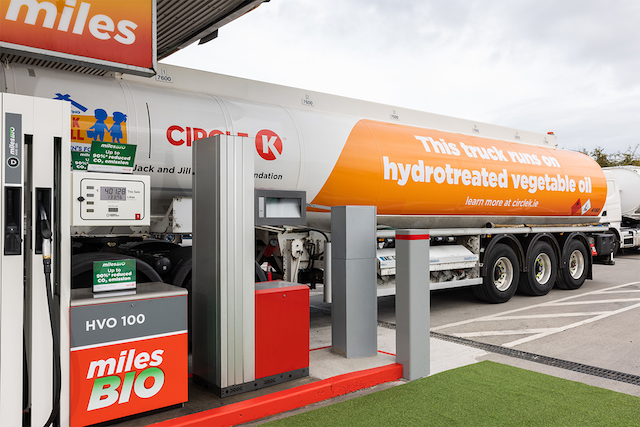With more and more haulage operators switching to Hydrotreated Vegetable Oil (HVO) to run their trucks, HGVIreland.com asked the question what are the benefits of this biofuel fuel over traditional fossil fuels such as diesel.

Hydrotreated Vegetable Oil (HVO) is a type of biofuel that offers numerous benefits compared to traditional fossil fuels and other biofuels.
Here are some key advantages:
Environmental Benefits
- Reduced Greenhouse Gas Emissions:
- HVO significantly reduces CO2 emissions compared to conventional diesel. The production and combustion of HVO result in lower carbon dioxide emissions, contributing to a decrease in overall greenhouse gas emissions.
- Lower Air Pollutants:
- HVO burns more cleanly than traditional diesel, resulting in lower emissions of harmful air pollutants such as particulate matter (PM), nitrogen oxides (NOx), and sulfur oxides (SOx). This leads to better air quality and reduced health risks.
- Renewable Source:
- HVO is produced from renewable feedstocks like vegetable oils and animal fats, making it a more sustainable option compared to fossil fuels.
Performance Benefits
- High Cetane Number:
- HVO has a higher cetane number compared to conventional diesel. A higher cetane number indicates better combustion quality, leading to improved engine performance, smoother operation, and reduced noise.
- Cold Weather Performance:
- HVO exhibits excellent cold weather performance with a lower cloud point and pour point than traditional biodiesel (FAME). This makes it suitable for use in colder climates without the need for additives.
- Compatibility:
- HVO is fully compatible with existing diesel engines and infrastructure. It can be used as a drop-in replacement for conventional diesel without requiring modifications to engines or fuel systems.
Economic and Practical Benefits
- Extended Engine Life:
- Due to its cleaner combustion properties, HVO can help reduce engine deposits and wear, potentially extending the life of engines and reducing maintenance costs.
- Energy Security:
- Utilizing HVO contributes to energy diversification and security by reducing dependence on fossil fuels and promoting the use of locally sourced renewable feedstocks.
- Waste Utilization:
- HVO can be produced from waste fats and oils, promoting the utilization of waste materials and contributing to a circular economy.
Sustainability and Certification
- Sustainable Production:
- Many HVO producers adhere to stringent sustainability criteria, ensuring that the feedstocks used do not contribute to deforestation or compete with food crops. Certification schemes such as the International Sustainability & Carbon Certification (ISCC) help verify the sustainability of HVO production.
- Carbon Footprint:
- The carbon footprint of HVO is generally lower compared to fossil fuels and even some other biofuels, especially when produced from waste feedstocks.
Overall, HVO presents a promising alternative to traditional fossil fuels, offering significant environmental benefits, performance advantages, and compatibility with existing infrastructure.


